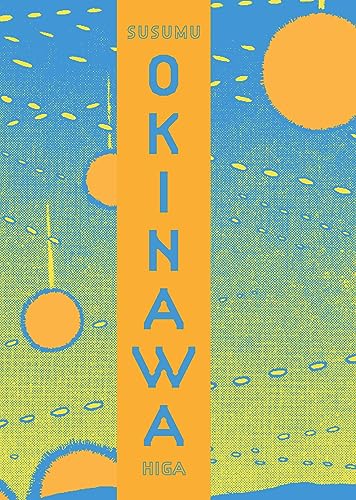 Originally published in Japan, Susumu Higa’s historical fiction manga Okinawa brings to life the experiences of Okinawans during World War II and the post-war experiences of both younger and older generations. This book binds together two of Higa’s previously published works: Sword of Sand (1995) and Mabui (2010). These narratives are told through illustrations and dialogue, along with onomatopoeia to emphasize actions, in the format of manga. Telling these stories through manga, a Japanese-style of visual storytelling like comics or graphic novels, combines the unique experiences of Okinawan people with the popular Japanese style of storytelling, bringing international readers both the popular culture of the dominant mainland Japan and the voices of a smaller, lesser known community. The United States Board of Books for Young People (USBBY) named Okinawa one of the Outstanding International Books (OIB) of 2024.
Originally published in Japan, Susumu Higa’s historical fiction manga Okinawa brings to life the experiences of Okinawans during World War II and the post-war experiences of both younger and older generations. This book binds together two of Higa’s previously published works: Sword of Sand (1995) and Mabui (2010). These narratives are told through illustrations and dialogue, along with onomatopoeia to emphasize actions, in the format of manga. Telling these stories through manga, a Japanese-style of visual storytelling like comics or graphic novels, combines the unique experiences of Okinawan people with the popular Japanese style of storytelling, bringing international readers both the popular culture of the dominant mainland Japan and the voices of a smaller, lesser known community. The United States Board of Books for Young People (USBBY) named Okinawa one of the Outstanding International Books (OIB) of 2024.
Black and white panels of manga tell the stories of Okinawans, based on real life from news reports Higa read about survivors of the war and events that happened during American rule, recursion, and the growing political call for the removal of U.S. military bases. This collection of narratives highlights Okinawan voices on a topic that is often only focused on Japanese and U.S. American stories. Interspersed between each narrative is a black and white photo of Okinawa, ranging from a look at the landscape to cultural practices in action. Also included is a biography of the author, an interview regarding Okinawa, and an excerpt of an additional essay recommended by Higa to provide more insight on the post-war islands of Okinawa.
Sword of Sand focuses on experiences of Okinawans during World War II. These stories ranged from mothers protecting their children, schoolboys forced to be soldiers and communities struggling to survive both American and Japanese violence. Mabui looks at indigenous religion, traditions and politics in post-war Okinawa, with each chapter beginning with a fact about U.S. military occupation in Okinawa that is accurate to statistics reported in 1996. The word “mabui” itself means “soul” or “spirit,” and each narrative shows how the lingering effects of the war, from the loss of life to the growing military bases on Okinawan land, affect the spirits of the people. These narratives highlight yuta, Okinawan priestesses and spiritual leaders who assist in soothing the mabui of troubled people.
This manga novel does not shy away from the horrors of war. The acts of violence are drawn in a very blunt, matter of fact way. The political tension in Mabui is treated similarly, with characters speaking the thoughts of Okinawan people without censoring it for mainland Japanese readers. These aspects of Okinawa make it a heavy read, but also an honest and worthwhile one.
These narratives reflect the lived experiences of my own family in Okinawa and resonate across generations in diaspora communities and local Okinawan communities. Higa’s work combines history and modern manga art to present an in-depth view of Okinawa rarely seen on English shelves. This new perspective on war and military colonization will spark insightful conversations among readers in and out of classrooms. –Recommended by Aika Adamson, University of Arizona, Tucson
Title: Okinawa
Author & Illustrator: Susumu Higa
Translator: Jocelyne Allen
ISBN: 9781683961185
Publisher: Fantagraphics
Pub. Date: August 22, 2023
Each month a committee of Worlds of Words advisors recommends a book published within the last year. Our hope is to spark conversations on our website and on social media about the book that expand global understandings and perceptions. Please join us by leaving a comment. You can also share your thoughts with us by using the hashtag #WOWRecommends on social media. Check out our alphabetical listing of all the books featured in WOW Recommends.
- Themes: Aika Adamson, Okinawa, Outstanding International Books (OIB), Susumu Higa
- Descriptors: WOW Recommends
